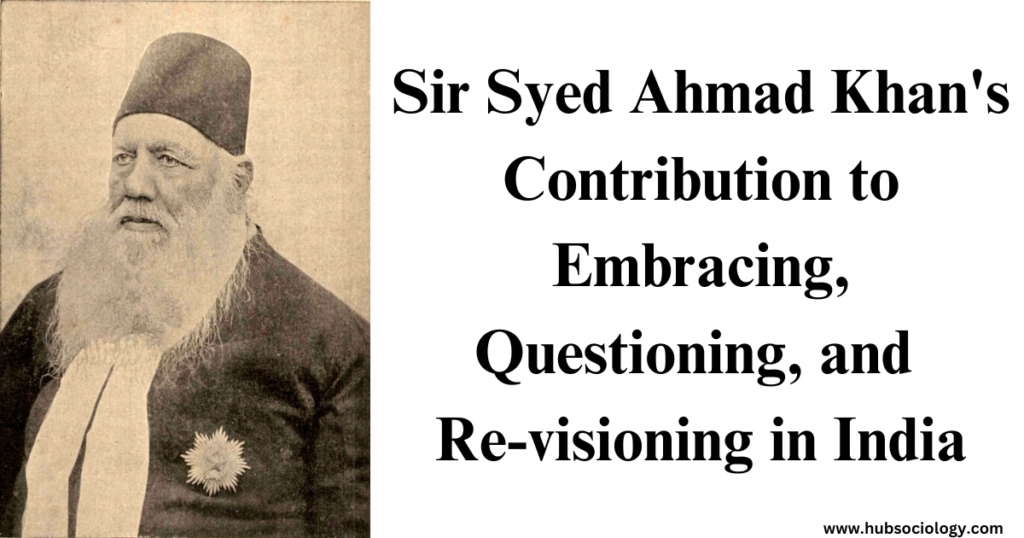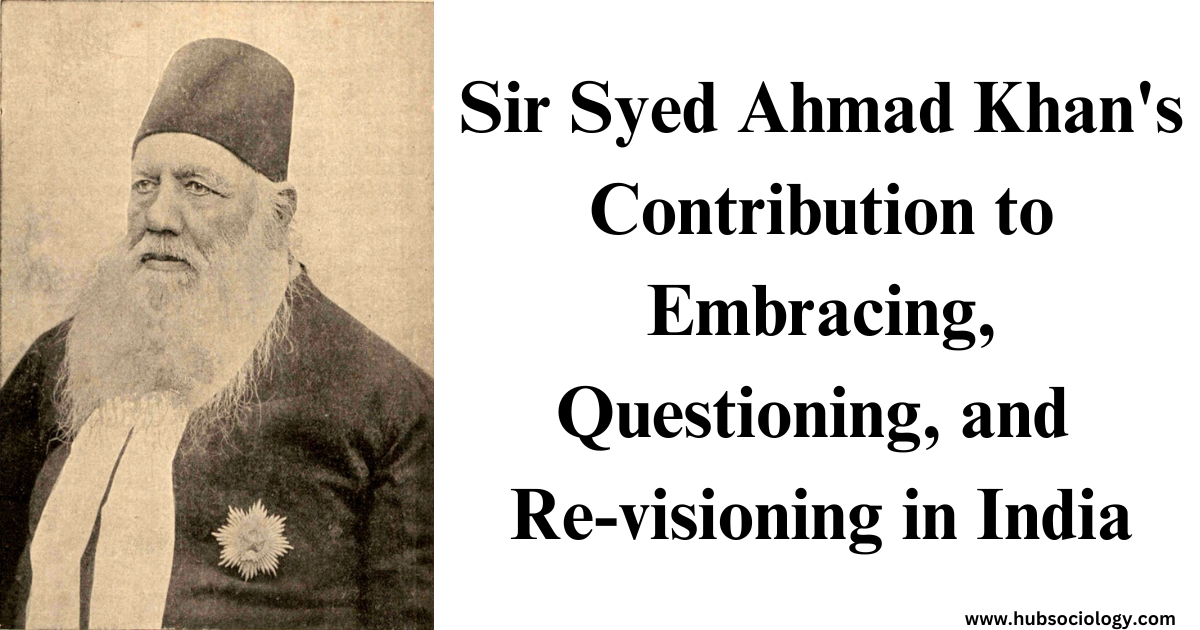Sir Syed Ahmad Khan (1817–1898) was a visionary reformer, educator, and social thinker whose contributions to Indian society during the 19th century were transformative. His work was deeply rooted in the sociological realities of his time, and his efforts to embrace modernity, question regressive traditions, and re-vision the future of Indian Muslims and the broader society remain relevant even today. From a sociological perspective, Sir Syed’s contributions can be analyzed through the lenses of embracing change, questioning established norms, and re-visioning societal structures to foster progress and unity in a deeply divided colonial India.

Embracing Modernity and Change
Sir Syed Ahmad Khan lived during a period of immense social, political, and cultural upheaval in India. The decline of the Mughal Empire, the rise of British colonialism, and the subsequent marginalization of Indian Muslims created a crisis of identity and purpose for the community. Sir Syed recognized that the key to survival and progress lay in embracing modernity and adapting to the changing socio-political landscape. His approach was not one of blind imitation but of critical engagement with Western ideas and institutions.
One of his most significant contributions was the establishment of the Muhammadan Anglo-Oriental College (MAO College) in Aligarh in 1875, which later became the Aligarh Muslim University. This institution was a pioneering effort to combine Western education with Islamic values, creating a space where Indian Muslims could acquire the skills and knowledge necessary to thrive in a modern, colonial society. From a sociological perspective, this was a radical departure from the traditional madrasa system, which focused primarily on religious education. Sir Syed’s emphasis on scientific temper, rational thinking, and modern education was a deliberate attempt to bridge the gap between tradition and modernity.
By advocating for the adoption of Western education, Sir Syed sought to empower Indian Muslims to participate in the administrative and intellectual spheres of colonial India. This was a pragmatic response to the socio-economic marginalization of Muslims, who had been disproportionately affected by the collapse of Mughal rule. His efforts to embrace modernity were not limited to education; he also encouraged Muslims to adopt modern social practices, such as abandoning purdah (veiling) for women and promoting gender equality in education. These reforms were aimed at creating a more progressive and inclusive society.
Questioning Regressive Traditions
Sir Syed Ahmad Khan was not afraid to question the regressive traditions and practices that hindered the progress of Indian Muslims. He believed that blind adherence to outdated customs and superstitions was one of the primary reasons for the community’s decline. His critical approach to tradition was rooted in a deep understanding of Islamic theology and a commitment to rationalism.
One of the most controversial aspects of Sir Syed’s work was his reinterpretation of Islamic teachings to align them with modern scientific and rational thought. He argued that there was no inherent contradiction between Islam and science, and he sought to dispel the myth that religious faith required the rejection of empirical knowledge. His seminal work, Tafsir-ul-Quran, was an attempt to reinterpret the Quran in light of contemporary scientific discoveries. This approach was revolutionary in a society where religious orthodoxy often stifled intellectual inquiry.
Sir Syed also challenged the rigid social hierarchies and caste-like divisions within Muslim society. He criticized the Ashraf-Ajlaf divide, which perpetuated social inequality and hindered communal solidarity. By advocating for social reform, he sought to create a more egalitarian society where individuals were judged by their merit rather than their birth. This was a radical idea in a society deeply entrenched in feudal and caste-based structures.
From a sociological perspective, Sir Syed’s questioning of regressive traditions was a form of social critique aimed at dismantling the structures of oppression and inequality. His emphasis on rationalism and scientific inquiry was not just an intellectual exercise but a call to action for the Muslim community to break free from the shackles of tradition and embrace a more progressive worldview.
Re-visioning the Future of Indian Society
Sir Syed Ahmad Khan’s most enduring contribution was his ability to re-vision the future of Indian society. He recognized that the challenges faced by Indian Muslims were not isolated but part of a broader socio-political context. His vision for the future was one of unity, progress, and coexistence.
One of the key aspects of Sir Syed’s re-visioning was his emphasis on Hindu-Muslim unity. Despite being a staunch advocate for Muslim rights, he believed that the future of India depended on the harmonious coexistence of its diverse communities. He opposed the divisive policies of the British colonial government and sought to foster a sense of shared identity among Indians. His famous statement, “Hindus and Muslims are the two eyes of the beautiful bride that is India,” reflects his commitment to communal harmony.

However, Sir Syed’s vision was not without its contradictions. His advocacy for Muslim separatism in the later years of his life, particularly his opposition to the Indian National Congress, has been a subject of debate among scholars. Some argue that this shift was a pragmatic response to the growing marginalization of Muslims in Indian politics, while others view it as a departure from his earlier ideals of unity. From a sociological perspective, this tension reflects the complex interplay between identity, politics, and power in a colonial society.
Sir Syed’s re-visioning also extended to the role of women in society. He was one of the first Muslim leaders to advocate for women’s education and empowerment. He believed that the progress of a society was intrinsically linked to the status of its women. By challenging patriarchal norms and promoting gender equality, he laid the foundation for a more inclusive and progressive society.
Sociological Legacy of Sir Syed Ahmad Khan
Sir Syed Ahmad Khan’s contributions to Indian society can be understood as a form of sociological praxis—a combination of theory and action aimed at transforming society. His efforts to embrace modernity, question regressive traditions, and re-vision the future were driven by a deep understanding of the social realities of his time. His work was not just about reforming the Muslim community but about creating a more just and equitable society for all Indians.
From a sociological perspective, Sir Syed’s legacy is multifaceted. He was a pioneer of modern education, a critic of social inequality, and a visionary who sought to bridge the gap between tradition and modernity. His emphasis on rationalism, scientific inquiry, and social reform continues to inspire generations of thinkers and activists.
However, his legacy is also a reminder of the challenges and contradictions inherent in the process of social change. His advocacy for Muslim separatism, for instance, highlights the complexities of identity politics in a pluralistic society. Similarly, his efforts to reinterpret Islamic teachings in light of modern science underscore the tension between tradition and modernity.
In conclusion, Sir Syed Ahmad Khan’s contributions to embracing, questioning, and re-visioning in India were transformative. His work was rooted in a deep understanding of the sociological realities of his time, and his vision for the future remains relevant in contemporary India. By challenging regressive traditions, promoting education, and advocating for social reform, he laid the foundation for a more progressive and inclusive society. His legacy serves as a testament to the power of ideas and the enduring impact of visionary leadership.
Topic Related Questions

5-Mark Questions (Short Answer Questions)
- What was Sir Syed Ahmad Khan’s vision for modern education in India?
- How did Sir Syed Ahmad Khan promote scientific temper among Indian Muslims?
- Briefly explain Sir Syed Ahmad Khan’s role in the establishment of the Aligarh Muslim University.
- What were Sir Syed Ahmad Khan’s views on Hindu-Muslim unity?
- How did Sir Syed Ahmad Khan challenge regressive traditions within the Muslim community?
- What was the significance of Sir Syed Ahmad Khan’s reinterpretation of Islamic teachings?
- How did Sir Syed Ahmad Khan contribute to women’s education in India?
- What was the impact of Sir Syed Ahmad Khan’s efforts on the socio-economic status of Indian Muslims?
- Explain Sir Syed Ahmad Khan’s critique of the Ashraf-Ajlaf divide in Muslim society.
- How did Sir Syed Ahmad Khan’s ideas influence the Indian freedom struggle?
10-Mark Questions (Detailed Answer Questions)
- Discuss Sir Syed Ahmad Khan’s contributions to the educational reform of Indian Muslims.
- Analyze Sir Syed Ahmad Khan’s efforts to reconcile Islamic teachings with modern scientific thought.
- How did Sir Syed Ahmad Khan’s establishment of the Muhammadan Anglo-Oriental College impact Indian society?
- Critically examine Sir Syed Ahmad Khan’s role in promoting communal harmony in colonial India.
- Discuss Sir Syed Ahmad Khan’s critique of traditional Muslim practices and his advocacy for social reform.
- How did Sir Syed Ahmad Khan’s ideas on modernity and progress influence the Muslim community in India?
- Evaluate Sir Syed Ahmad Khan’s contributions to the empowerment of women in Indian society.
- Explain Sir Syed Ahmad Khan’s role in addressing the socio-political marginalization of Indian Muslims.
- Discuss the significance of Sir Syed Ahmad Khan’s reinterpretation of the Quran in the context of modern India.
- How did Sir Syed Ahmad Khan’s vision for India differ from that of other contemporary reformers?
15-Mark Questions (Essay-Type Questions)
- Critically analyze Sir Syed Ahmad Khan’s contributions to embracing modernity, questioning traditions, and re-visioning the future of Indian society.
- Discuss Sir Syed Ahmad Khan’s role as a social reformer and his impact on the socio-cultural transformation of Indian Muslims.
- Evaluate Sir Syed Ahmad Khan’s efforts to bridge the gap between tradition and modernity in colonial India.
- How did Sir Syed Ahmad Khan’s educational reforms contribute to the empowerment of Indian Muslims? Discuss with examples.
- “Sir Syed Ahmad Khan was not just a reformer but a visionary who redefined the future of Indian Muslims.” Elaborate on this statement.
- Analyze Sir Syed Ahmad Khan’s contributions to the fields of education, social reform, and communal harmony in India.
- Discuss the sociological significance of Sir Syed Ahmad Khan’s efforts to promote rationalism and scientific thinking among Indian Muslims.
- Critically examine Sir Syed Ahmad Khan’s role in addressing the challenges faced by Indian Muslims in the 19th century.
- How did Sir Syed Ahmad Khan’s ideas on Hindu-Muslim unity evolve over time? Discuss their relevance in contemporary India.
- “Sir Syed Ahmad Khan’s legacy lies in his ability to question the status quo and re-vision a progressive future for India.” Discuss this statement in detail.
